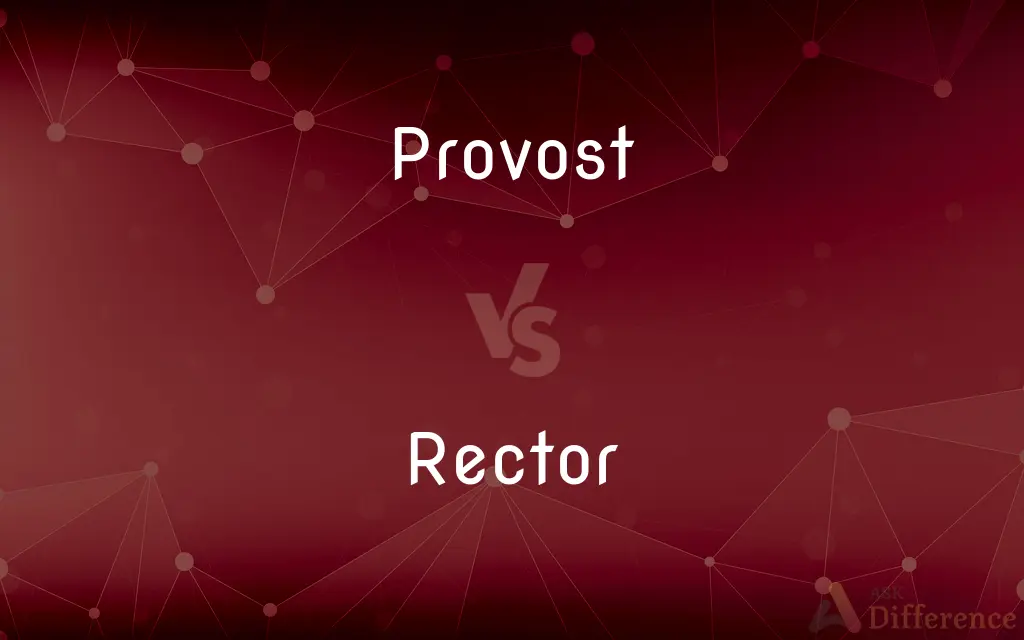Provost vs. Rector — What's the Difference?
By Tayyaba Rehman & Urooj Arif — Updated on March 30, 2024
Provost is a senior administrative officer in universities, often second to the president, handling academic affairs, while rector refers to the head of a university or an institution, similar to a president or chancellor.

Difference Between Provost and Rector
Table of Contents
ADVERTISEMENT
Key Differences
Provost often serves as the chief academic officer in a university, overseeing all academic policies, faculty matters, curriculum, and sometimes research. The role can vary by institution but generally includes responsibilities such as faculty appointments, budget management for academic departments, and development of academic programs. In contrast, rector is a term used for the head of a university or academic institution in many countries, holding responsibilities akin to those of a chancellor or president in the United States. The rector oversees the entire operation of the university, including academic, administrative, financial, and student affairs.
In the hierarchy of university administration, the provost typically reports to the president or chancellor and may act as the chief executive in their absence. This position is integral to linking the academic core of the university with its administrative governance. On the other hand, the rector is at the top of the institutional hierarchy, answering to a board of trustees or governors and representing the university in its entirety to the external community and stakeholders.
The role of provost is primarily internal and focused on the academic heartbeat of the institution, aiming to enhance the quality of education, research, and faculty life. Whereas the rector, as the face of the university, has a more external role in addition to internal governance, involving public representation, fundraising, and strategic partnerships beyond the academic realm.
The term "provost" is more commonly used in the United States and some other English-speaking countries, reflecting the structure and nomenclature of university administration there. "Rector," however, is used in various forms around the world, including parts of Europe, Latin America, and the Middle East, indicating a role that might encompass both the responsibilities of a president and sometimes those akin to a provost, depending on the specific governance model of the institution.
While both provost and rector are pivotal in the governance and leadership of academic institutions, their roles and the emphasis on their responsibilities can vary significantly based on the geographic and institutional context. The provost's focus is more narrowly academic with a strong influence on faculty and curriculum, while the rector's role is broader, encompassing the overall leadership and strategic direction of the institution.
ADVERTISEMENT
Comparison Chart
Primary Role
Chief academic officer, overseeing academic policies and faculty.
Head of the university or institution, similar to a president.
Hierarchy
Typically reports to the president or chancellor.
Top of the university's administrative hierarchy.
Focus
Academic affairs, faculty appointments, curriculum development.
Overall operation, including academic, administrative, and financial affairs.
Representation
Acts internally, linking academic and administrative governance.
External and internal representation, strategic partnerships.
Geographic Usage
Common in the United States and some English-speaking countries.
Widely used worldwide, including Europe, Latin America, and the Middle East.
Responsibilities
Internal academic quality, research, faculty life.
Broad leadership, public representation, strategic direction.
Compare with Definitions
Provost
Senior academic administrator.
The provost launched a new initiative to improve undergraduate education.
Rector
Head of a university or academic institution.
The rector announced a significant expansion of the university's campus.
Provost
Oversees academic policies and curriculum.
Curriculum revisions require the approval of the provost.
Rector
Similar to a chancellor or president in responsibilities.
As rector, she spearheaded the international partnership program.
Provost
Acts as chief executive in the president's absence.
During the president's sabbatical, the provost will oversee university operations.
Rector
Oversees comprehensive university operations.
The rector is involved in both academic and financial planning.
Provost
Manages faculty affairs and budgeting for academic departments.
The provost played a key role in faculty recruitment this year.
Rector
Represents the institution externally.
The rector met with government officials to discuss education funding.
Provost
Links academic and administrative sectors.
The provost works closely with deans to align academic programs with university goals.
Rector
Strategic leader and public figure.
Under the new rector's leadership, the university rose in national rankings.
Provost
A university administrator of high rank.
Rector
(in the Church of England) the incumbent of a parish where all tithes formerly passed to the incumbent.
Provost
The highest official in certain cathedrals or collegiate churches.
Rector
The head of certain universities, colleges, and schools.
Provost
The keeper of a prison.
Rector
A cleric in charge of a parish in the Episcopal Church.
Provost
The chief magistrate of certain Scottish cities.
Rector
An Anglican parish priest in a parish where historically the priest was entitled to the tithes.
Provost
One placed in charge: a head, a chief, particularly:
Rector
A Roman Catholic priest appointed to be managerial as well as spiritual head of a church or other institution, such as a seminary or university.
Provost
A dean: the head of a cathedral chapter.
Rector
The principal of certain schools, colleges, and universities.
Provost
(religion) The head of various other ecclesiastical bodies, even muezzins.
Rector
In the Anglican Church, a cleric in charge of a parish and who owns the tithes of it.
Provost
(religion) The minister of the chief Protestant church of a town or region in Germany, the Low Countries, and Scandinavia.
Rector
In the Roman Catholic Church, a cleric with managerial as well as spiritual responsibility for a church or other institution.
Provost
The head of various colleges and universities.
Rector
A priest or bishop who is in charge of a parish or in an administrative leadership position in a theological seminary or academy.
Provost
(obsolete) A ruler.
Rector
In a Protestant church, a pastor in charge of a church with administrative and pastoral leadership combined.
Provost
A mayor: the chief magistrate of a town, particularly (Scotland) the head of a burgh or (historical) the former chiefs of various towns in France, Flanders, or (by extension) other Continental European countries.
Rector
A headmaster in various educational institutions, e.g. a university.
Provost
A senior deputy, a superintendent, particularly:
Rector
(Scotland) An official in Scottish universities who heads the university court and is elected by and represents the student body.
Provost
A prior: an abbot's second-in-command.
Rector
A ruler or governor.
God is the supreme rector of the world.
Provost
A senior deputy administrator; a vice-president of academic affairs.
Rector
A clergyman who has the charge and cure of a parish, and has the tithes, etc.; the clergyman of a parish where the tithes are not impropriate. See the Note under Vicar.
Provost
(historical) A steward or seneschal: a medieval agent given management of a feudal estate or charged with collecting fees; a title of the archangel Michael.
Rector
The head master of a public school.
Provost
(historical) Any manager or overseer in a medieval or early modern context.
Rector
The chief elective officer of some universities, as in France and Scotland; sometimes, the head of a college; as, the Rector of Exeter College, or of Lincoln College, at Oxford.
Provost
(obsolete) A viceroy.
Rector
The superior officer or chief of a convent or religious house; and among the Jesuits the superior of a house that is a seminary or college.
Provost
(obsolete) A governor.
Rector
A person authorized to conduct religious worship
Provost
(obsolete) A reeve.
Provost
(obsolete) The head of various Roman offices, such as prefect and praetor.
Provost
(historical) A constable: a medieval or early modern official charged with arresting, holding, and punishing criminals.
Provost
(military) An officer of the military police, particularly provost marshal or provost sergeant.
Provost
An assistant fencing master.
Provost
A provost cell: a military cell or prison.
Provost
To be delivered to a provost marshal for punishment.
Around the time of the Rebellions of 1837 and the First Anglo-Afghan War, British servicemen spoke of being provosted.
Provost
A person who is appointed to superintend, or preside over, something; the chief magistrate in some cities and towns; as, the provost of Edinburgh or of Glasgow, answering to the mayor of other cities; the provost of a college, answering to president; the provost or head of certain collegiate churches.
Provost
The keeper of a prison.
Provost
A high-ranking university administrator
Common Curiosities
What qualifications are needed to be a provost or a rector?
Both roles typically require extensive academic and administrative experience, often with a doctoral degree.
Is the role of a rector the same in every country?
The specifics can vary, but the role typically includes overarching leadership of an academic institution.
Are the terms provost and rector interchangeable?
Not exactly; while both are senior academic roles, their responsibilities and positions in the hierarchy differ.
How do provosts and rectors interact?
In institutions where both positions exist, they work closely on strategic planning and academic governance.
What does a provost do?
Oversees academic affairs, including curriculum, faculty, and research initiatives.
Can a provost become a rector?
Yes, it's possible for a provost to advance to a rector or president position, depending on the institution.
Do all universities have both a provost and a rector?
No, the administrative structure varies by institution and country.
What is the typical career path to becoming a provost?
It often involves rising through academic and administrative ranks, such as from faculty member to department chair to dean.
Who is higher, a provost or a rector?
A rector is generally the top administrator, equivalent to a president, while a provost is often second in command.
What is the main difference between a provost and a rector?
The provost focuses on academic affairs within the university, while the rector has a broader leadership role that includes external representation.
Why is the role of a rector important?
The rector sets the strategic direction and vision of the institution, representing it to external stakeholders.
How does the role of a provost impact students?
Through oversight of academic programs and faculty, the provost directly influences the quality of education.
What challenges do rectors face?
Rectors deal with challenges ranging from financial management to maintaining academic excellence and innovation.
Can a rector also teach classes?
While uncommon due to their administrative duties, some rectors may occasionally teach.
What makes a successful provost or rector?
Leadership skills, vision for the institution's future, and the ability to navigate academic and administrative challenges.
Share Your Discovery

Previous Comparison
Seye vs. Stye
Next Comparison
Amaze vs. AmuseAuthor Spotlight
Written by
Tayyaba RehmanTayyaba Rehman is a distinguished writer, currently serving as a primary contributor to askdifference.com. As a researcher in semantics and etymology, Tayyaba's passion for the complexity of languages and their distinctions has found a perfect home on the platform. Tayyaba delves into the intricacies of language, distinguishing between commonly confused words and phrases, thereby providing clarity for readers worldwide.
Co-written by
Urooj ArifUrooj is a skilled content writer at Ask Difference, known for her exceptional ability to simplify complex topics into engaging and informative content. With a passion for research and a flair for clear, concise writing, she consistently delivers articles that resonate with our diverse audience.














































